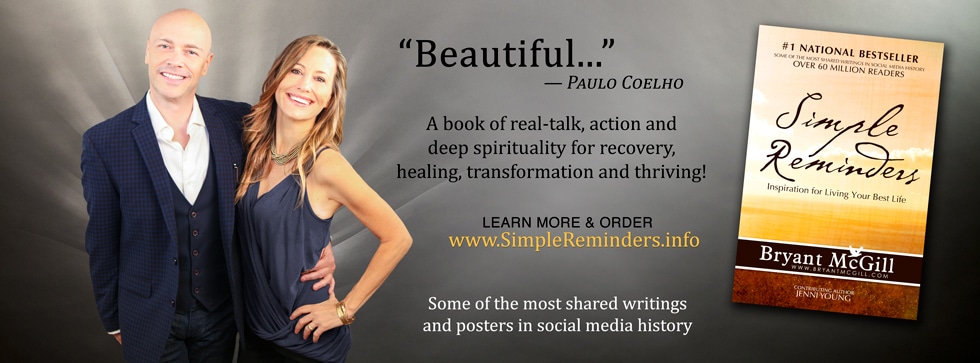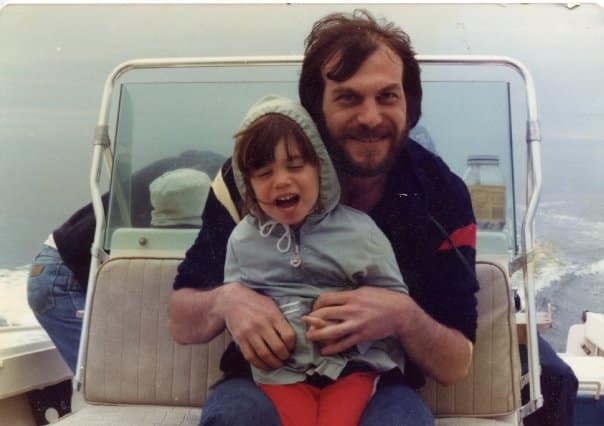By Jen Pastiloff.
It comes down to this: there are fathers everywhere.
Look. There’s one. And another. You just missed one! Right there, there’s one. And here. They’re everywhere really, the fathers.
And they always will be everywhere.
Here’s one- proudly thanking everyone for coming to his daughter’s baby shower, first grandchild, so proud. Maybe there’s one sitting in a jail cell, picking his fingers, his feet. One’s holding the hand of his little boy, Watch out, it’s crowded here, hold tight. Herds of them driving down the highway in the rain, never coming back, not while it still matters, anyway. And it’ll always be that way. The everywhereness of them all.
You will look up and the world will be a sky of fathers, men puffing cigars will fill the air, men in droves, men with daughters. Everyone will be a father pulling out a picture of his first grandchild to show the world Would you look at that? Would you just look at that?
You will look up and notice, and you may be the only one who notices, that the sky has been replaced with these fathers, and also the banks and the streets. There will be nothing else.
It will be all you see at times.
It comes down to this: whatever you are missing will suddenly appear to be back in the world, its own cardiovascular system of pain, forgotten until you realize that as much as it’s back in the world, it will always be just beyond your reach.
You will notice it everywhere like when you start to notice pregnant women everywhere or how many blue cars are on the road (They are everywhere! Would you look at that? Would you look at that?) Your heart, once again a closed fist. A hand open, flat and rough, its lines suggesting “long life and contentment with love life”. But the heart line is missing.
The hand curls and touches the heart and they meet but do not understand what the meeting means and why it feels like a part of each is missing.
It comes down to this: your pain in waves, it turns, leaches on to things. Years of your life, for example. Your pain wraps itself around whole years like a tentacle and won’t let go until you understand that it is the organ of touch, so you reach out and touch it and then, only then, it slithers off, as if all it needed was to be noticed.
*
I was at a baby shower not too long ago where the girl was having her first baby. Her father stood up to make a speech and looked over at her big belly with a swell of the chest, a Look at my little girl. Look at us.
I was thrilled for her and yet tears, (where are these coming from?) Tears in my egg whites and arugula with the chicken picked out of it. I will never have that as I pour salt on the eggs. Why whites? Why no yolk? I need more yellow here and all of a sudden fathers everywhere showing off their pregnant daughters. No women are even in the room anymore. The eggs, in fact, have turned into little fathers. Would you look at that? Would you just look at that?
The pain comes in waves. The initial shock of loss. The teenage years angst. The reduction of it all to poetry.
Then, the loss of what is yet to come. The mourning of something that hasn’t even occurred yet.
It comes down to this: we recognize when possibility has been eliminated.
When there is never a chance of this or that, we know it, and our hearts mourn something that doesn’t even have a name yet. I’ll never have that and yet I am sad. I am devastated. I can’t go on. I am ruined.
More salt on eggs. Presents being opened. Fathers all over the world, clapping.
*
It comes down to this: you find cracks in the pain and slip into them. You can live there, at least for a while, from that place down low, the place of I am untouched by loss until you get to a baby shower and you notice that the crack has sealed up, the cement has pushed you up and out in the world again and you are in the middle of it all, fin-footed as a seal, unable to move, so you too clap.
Would you look that that? Would you just look at that?
Somebody loves us all, says Elizabeth Bishop in her poem Filling Station.
Oh, but it is dirty!
–this little filling station,
oil-soaked, oil-permeated
to a disturbing, over-all
black translucency.
Be careful with that match!
Father wears a dirty,
oil-soaked monkey suit
that cuts him under the arms,
and several quick and saucy
and greasy sons assist him
(it’s a family filling station),
all quite thoroughly dirty.
*
Oh, but it is dirty! This pain, you think, is dirty. How dilapidated, how old! How worn-out, how broken down, how enough is enough of it all. How dirty my pain is, how me-centric, how grimy. How many poems I have written of it, how many eggs, how many cracks in the sidewalk.
I remember one of my own father poems, one of the many (hundreds) I’d written when I was 19 years old at Bucknell University where I had a poetry fellowship.
TO MY FATHER, AFTER HIS DEATH
I knew that you weren’t really dead.
That if I kept looking, kept driving,
I’d find you.
Didn’t think it would be here though,
that you’d be pumping gas
in Kansas.
You still smoke.
I can tell.
The way your shoulders hunch over
gives you away.
When you push nozzles into canals,
into the backs of cars,
you heave, your shoulders roll.
Your stomach reaches closer to your back,
toward smooth pink scars.
You look smaller,
shirking into yourself like that.
Silently pumping gas, coughing occasionally,
scratching your sunburned bald spot.
I watch you from the shoulder of I-70
through dead bugs on my windshield.
There is a small convenience store
attached to the gas station.
You enter it,
and when you emerge
I see the bulge in your pants.
You’ve bought Kools: your brand of cigarettes.
Stashed them in your front hip pocket,
next to an Almond Joy.
I see you still
squint, smoke,
have bad posture,
eat Almond Joys.
Quiet as ash,
you in the Kansas of Colorado,
one foot almost in each state.
The moment you noticed me
must have been when
you straightened your back up,
crushed your half smoked cigarette
and smiled.
But you know I can’t come any closer.
I can’t pull into the station,
roll down my window and touch your face.
*
The facts are what remains: gas stations, baby showers, cigarettes, candy bars- Hell, all of it, will be the things that remind me of my father.
Loss doesn’t occur in a vacuum. These losses exist out in the world and sometimes in a plate of eggs. Sometimes, when you least expect it (and I hope for all of our sakes that we aren’t always expecting the worst) we will crumble at the site of a see-saw, a beard, a Pepsi. I wish it wasn’t a fact. I wish that you and I could go on and pour salt on our eggs and clap with the rest of the people and that we wouldn’t feel a thing. Not even a twang.
But that would be a lie. The things that shape us are where the beauty resides.
Jennifer Pastiloff, Beauty Hunter, is the founder of The Manifest-Station. Check out jenniferpastiloff.com for all retreat listings and workshops to attend one in a city near you. Next up: South Dakota, NYC, Dallas, Kripalu Center For Yoga & Health, Tuscany. She is also leading a Writing + The Body Retreat with Lidia Yuknavitch Jan 30-Feb 1 in Ojai (sold out) as well as Other Voices Querétaro with Gina Frangello, Emily Rapp and Rob Roberge. She tweets/instagrams at @jenpastiloff.



Thank you for giving words when sometimes they fail
This is a great post! I love those pictures too! So adorable!
Please check out my blog too and let’s follow each other!
http://www.juliecrombe.com
Jennifer you are such a gifted writer. Namaste, Paula
So many vivid metaphors and poignant pieces dear ♡Jennifer. Thank you.
I am especially touched by
“Loss doesn’t occur in a vacuum….. …… I wish that you and I could go on and pour salt on our eggs and clap with the rest of the people and that we wouldn’t feel a thing. Not even a twang.
But that would be a lie. The things that shape us are where the beauty resides….”
My father died when I was 11 and I don’t have the poignancy of feeling that you do. You are inspiring me to explore touching into that place in me.
Gratefully and with LOVE Susie♡
I needed this. On the 18th of December it will be 5 years since my Dad passed away and I see him… well I think I see him but part of me knows that I don’t…
I see an older man walking down the street and wonder if he would have looked like that, I see grandfathers out with their grandkids and feel jealous, hurt and yep a lot peeved that my kids can’t do that.
Five years on and I see glimpses of him, look for him but never fnd him.
“Sometimes, when you least expect it …we will crumble at the site of a see-saw, a beard, a Pepsi” so true, thankyou for a timely and very beautifully written piece <3
So touching. Thank you for sharing and encouraging the rest of us to be okay with our losses.
Biggest lump in my throat. Love you. Thank you.
Incredible imagery in this piece. Can feel the eggs cracking inside me.
Jen, i”m so sorry that you experienced this loss. I lost my dad when i was 15 and my mom when i was 25. I feel and know your pain. sending lots of love.